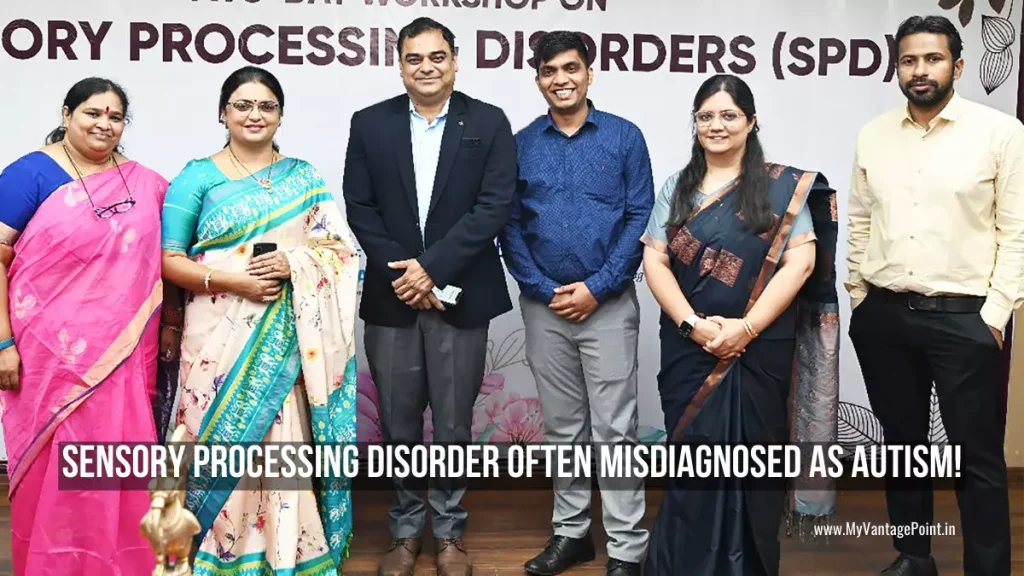Sensory Processing Disorder is often misdiagnosed as Autism!
o Misdiagnosis deprives apt therapy during the precious formative years
o SPD kids endure the disorder for lifetime due to lack of right therapy at the right time
o Hear & Say Clinic & Maa Research Foundation; host a first of its kind Workshop to highlight the inappropriate or inadequate diagnosis & therapy and its consequences
Sensory Processing Disorder (SPD), the lack of coordination between the perception of sensory information received by an individual and his unrelated or lack of response to it; is often misdiagnosed as Autism Spectrum Disorder (ASD) – a learning disability. The inaccuracy in diagnosis is due to the superficial symptoms of SPD resembling that of ASD. Such misdiagnosis deprives the child suffering from SPD of right therapy at the right time during their formative years. The inappropriate or inadequate diagnosis and therapy limits the treatment access either partially or totally, impacting the child for its lifetime. The incidence of SPD is around one in every twenty in the general population and one in every six children with ASD, may have SPD.

There isn’t adequate data on children diagnosed as Autism and Sensory Processing Disorders, consequently several are misdiagnosed on account of this, says Dr Garima Vegivada.
A child with SPD has impairment in the way his brain processes the sensory information that is used to regulate behaviour and motor function such as balance, walking and coordination. These children are able to see, hear and sense their body but are unable to organise their senses and respond appropriately. They generally can’t judge distances or make out the shape of one object against another. Unlike normal children who grasp the sensory inputs they are fed, SPD children gradually learn to organise them within their brain and give meaning to them, however they would require professional help to do that.
It is generally difficult for parents to conclusively define the problem their child has and differentiate between ASD or SPD. They presume the sensory issues of their child to be ASD, based mostly on the diagnosis of the paediatrician. Only an Occupational Therapist with an in depth diagnosis can conclusively prove it to be SPD, says Dr Sai Krishna Vegivada.
Occupational therapists work on activities that help retrain the senses of such children. They use sensory integration (SI) approach in a controlled, stimulating environment, which challenges the senses without overwhelming the patient and helps prevent they developing the feelings of failure. The objective is to extend the appropriate responses developed by the patient in simulating conditions, to be used overtime in facing the outside world, be it home, school or any social interactions.
Training, quality education and research on Sensory Processing Disorders is the need of the hour, the expeditiously we do this, the more beneficial it is for people suffering from SPD in terms of accurate diagnosis and treatment, says Mrs Sunita G Kumar, Founder Chairperson, Maa Research Foundation and Maa Institute of Speech.
One of the reasons for Sensory Processing Disorder not gaining the primacy it deserves is its non-inclusion among the conditions spelled out in the Diagnostic and Statistical Manual (DSM), the reference guide for clinicians including paediatricians, psychologists, and social workers, to diagnose the symptoms. Therefore DSM needs to acknowledge SPD to sensitise the medical professionals, at the earliest. Also creating mass awareness among parents to proactively get their new born screened for SPD is critical. The parents of children with SPD should scout for professional Occupational therapists with advanced training in sensory processing and integration, who can understand the condition and provide optimum treatment. It is also important for Government hospitals, Paediatric hospitals to be equipped with sensory integration units manned by qualified Occupational therapists, to deal with such conditions.
Dr Aparna Ravichandran, Principal- Maa Institute of Speech and Hearing said, we are counselling and moulding the children suffering from SPD, with evidence-based practices.
A Sensory Processing Disorders Workshop was organised for the first time in Hyderabad, jointly by Maa Research Foundation; Maa Institute of Speech and Hearing and Hear ‘N’ Say clinic; at Maa Institute, today. The Workshop highlighted the lacunae in the diagnosis of Sensory Processing Disorders, the resultant consequences and equipped the delegates working with such children to be more efficient. The faculty comprised of Mr Loganthan Gurusamy, a specialist in the area of SPD from Therapy India, Mumbai; Mr Gish Chacko, Vice principal, Maa Institute of Speech and Hearing; Dr Sai Krishna Vegivada, Clinical Director Audiology, Hear ‘N’ Say clinic and Dr Garima Vegivada, Clinical Director Rehabilitation, Hear ‘N’ Say clinic and founder of People Beyond Limits Foundation.
Chief Guest Dr Ashish Chauhan, Internal Medicine Consultant, Apollo Hospitals; emphasized the importance of early identification of this disorder and the role Occupational therapist and Speech therapist play in its treatment.


















